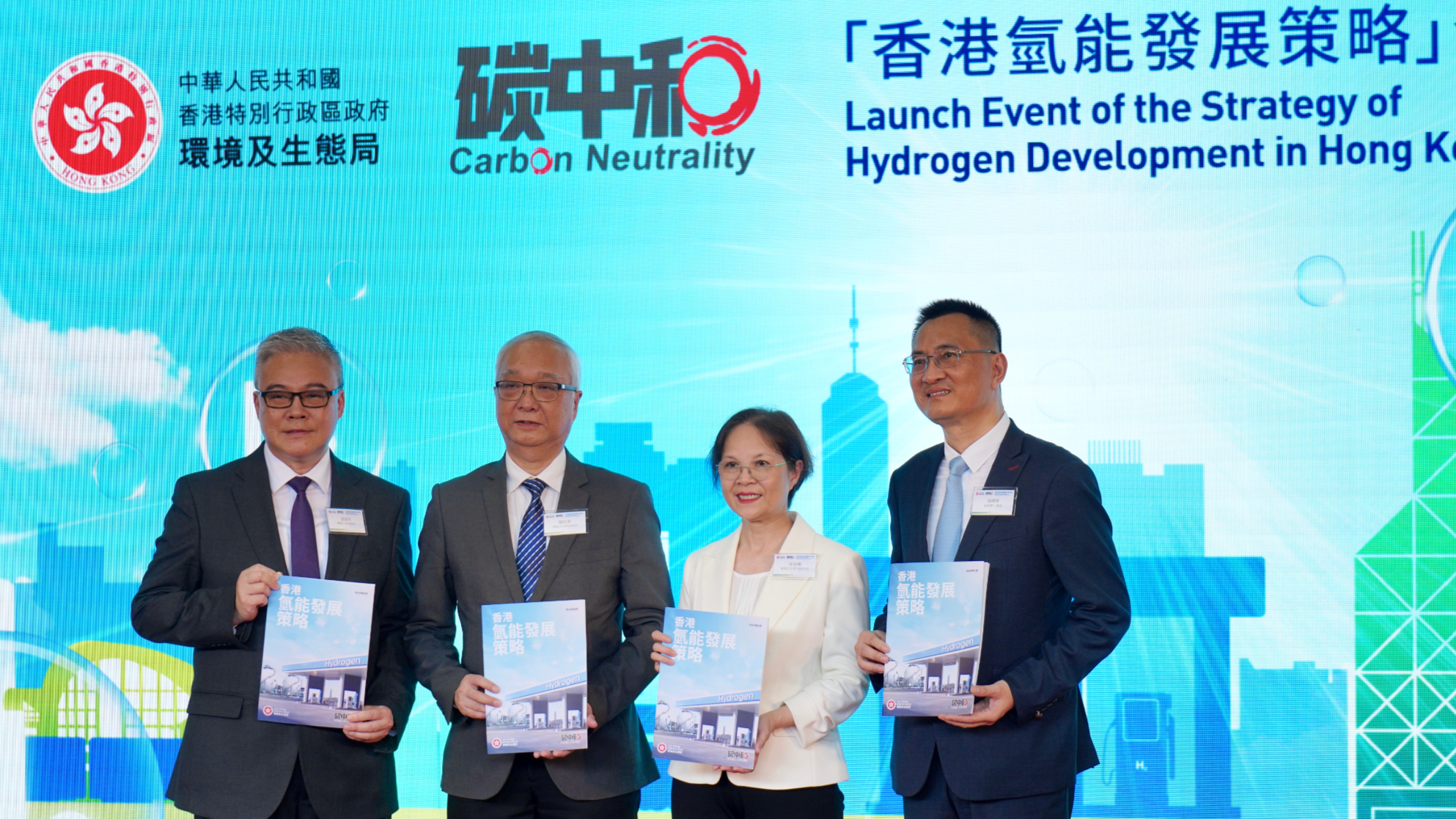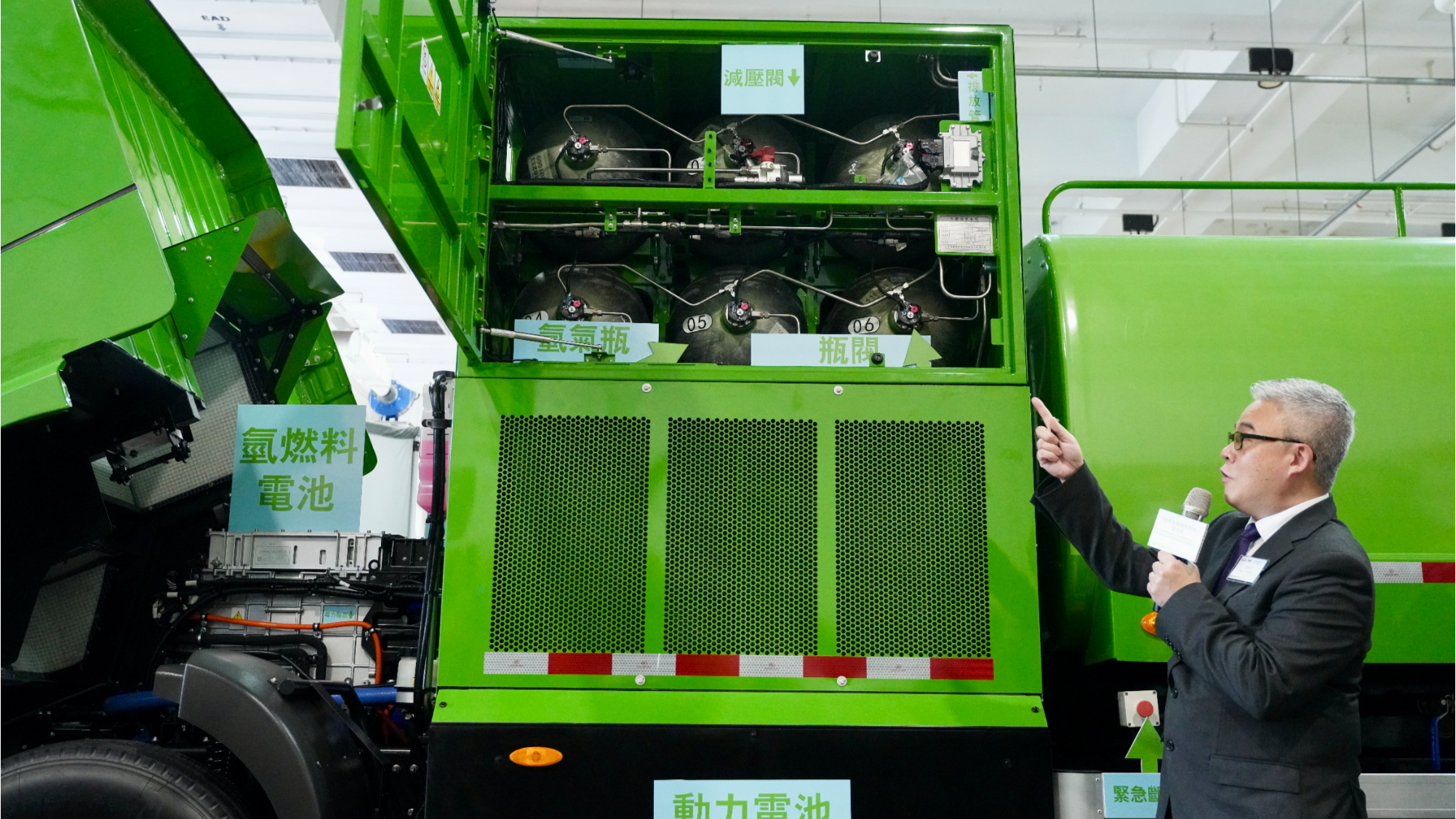
The Hong Kong Special Administrative Region government plans to submit a proposal to the Legislative Council in the first half of 2025 to provide a legal foundation for regulating the use of hydrogen energy, paving the way for the city’s transition to clean energy.
Speaking at the launch of the “Strategy of Hydrogen Development in Hong Kong” on Monday, Secretary for Environment and Ecology Tse Chin-wan said that authorities aim to regulate the production, storage, transportation, supply, and use of hydrogen fuel, with the goal of aligning the city’ hydrogen energy standards and certifications with international norms by 2027, or even earlier.
Hong Kong’s first-ever hydrogen bus began service on Feb 25. The MTR Corp plans to test hydrogen-powered trains on its light rail system in the second half of the year. And a hydrogen refueling station at Au Tau, Yuen Long, is expected to begin operations this year
A hydrogen fuel cell street-washing vehicle, one of the government’s 14 approved pilot projects in clean energy transportation and infrastructure, was unveiled during the news conference. Three hydrogen-powered vehicles, emitting only water vapor and boasting long driving ranges and quick refueling times compared with battery-electric models, are set to hit the roads later this year.
READ MORE: In HK, two more hydrogen fuel projects get initial govt nod
At a separate interview, Sam Hui Kin-sang, CEO of CabCab, a local taxi management solution provider, said, “The street sweepers, being specialized utility vehicles that operate on a point-to-point basis, can help solve some of the challenges associated with hydrogen transportation and storage.
“There are already two or three manufacturers on the Chinese mainland producing hydrogen-powered special utility vehicles, and the technology is gradually maturing,” he added.
Hui said he expects the trial program to be a crucial step in the wider adoption of vehicles that operate on hydrogen fuel, “such as buses and tour coaches”.
Chief Executive John Lee Ka-chiu had earlier said the government is also considering introducing hydrogen energy into garbage trucks and trams.
Hong Kong’s first-ever hydrogen bus began service on Feb 25. The MTR Corp plans to test hydrogen-powered trains on its light rail system in the second half of the year. And a hydrogen refueling station at Au Tau, Yuen Long, is expected to begin operations this year.

The government’s interdepartmental working group on hydrogen energy, established two years ago, has formulated provisional standards for hydrogen energy applications in Hong Kong.
Tse highlighted the importance of collaboration with the mainland in the development of the city’s hydrogen energy sector, as complete self-reliance is “impractical” for Hong Kong as an international business hub.
Hong Kong aims to slash its carbon emissions to 50 percent of its 2005 levels by 2035, a target that includes ending coal use for daily electricity generation; promoting electric vehicles
“In the long-term development, Hong Kong … relies heavily on imports for many resources and products. The mainland’s hydrogen energy sector has a certain foundation in key technologies and production processes such as hydrogen preparation, storage and transportation, charging, fuel cells, and system integration, some of which are even in a leading position globally. Therefore, domestic technology can provide support and opportunities for Hong Kong,” he said.
READ MORE: Green transition: Hong Kong rolls out first hydrogen bus
Tse said that local authorities will also promote regional cooperation, overseas investment, joint development, and the importation of hydrogen energy.
“We will give full play to our unique advantages of having the strong backing of the mainland and being connected to the world, promoting Hong Kong as a demonstration base for the country’s development of hydrogen energy and assisting in the development of the hydrogen energy industry” in the countries involved with the Belt and Road Initiative, he said.

Hong Kong aims to slash its carbon emissions to 50 percent of its 2005 levels by 2035, a target that includes ending coal use for daily electricity generation; promoting electric vehicles; and achieving zero landfill use, all as part of the city’s broader plan to reach carbon neutrality by 2050.
Contact the writer at tianyuanzhang@chinadailyhk.com


